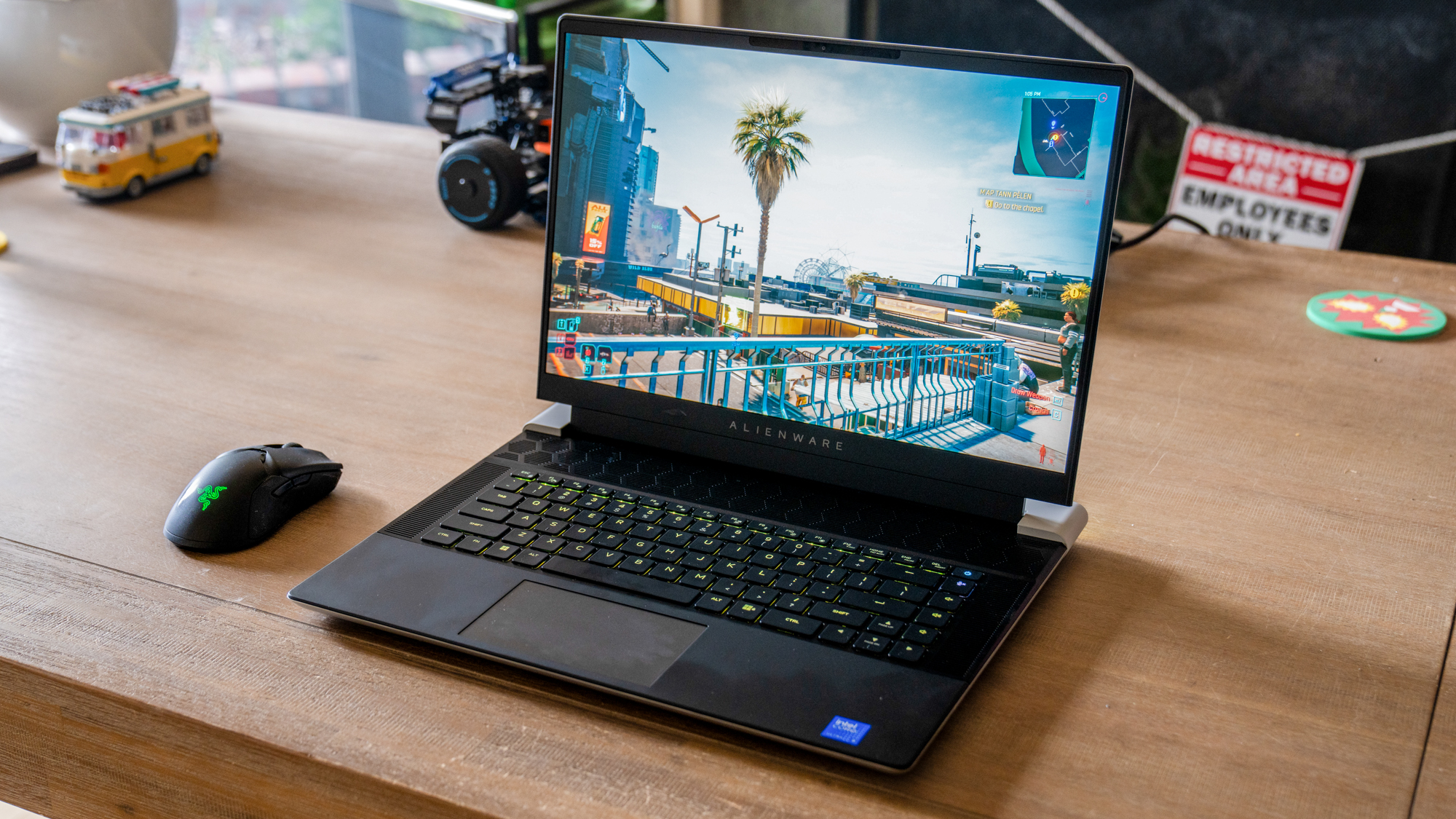
Dell's Alienware x16 R2 ($2,099 to start) is the archetypal gaming laptop, gobbling up cash and belching out frames per second.
It's heavy. The battery life's not great. The fans on our review unit are as loud as the RGB lighting and at $3,199 (as configured) it's a heady investment to pour into mashing pixels together.
But it's also cool (metaphorically), coupling readily customizable aesthetics with performant hardware in a sleek package that looks and feels fun. Between the honeycomb-grille patterns, extensive (excessive? never) RGB lighting and loud fans the machine screams "gamer," which isn't going to be to everyone's tastes.
But if you want to pay for performance, this is a great place to start. And while the aggressive gamer aesthetics and high price tag ensure the Alienware x16 R2 isn't for everyone, it has what it takes to compete with the best gaming laptops on the market. In this Alienware x16 R2 review I'll show you why.
Alienware x16 R2 review: Cheat sheet
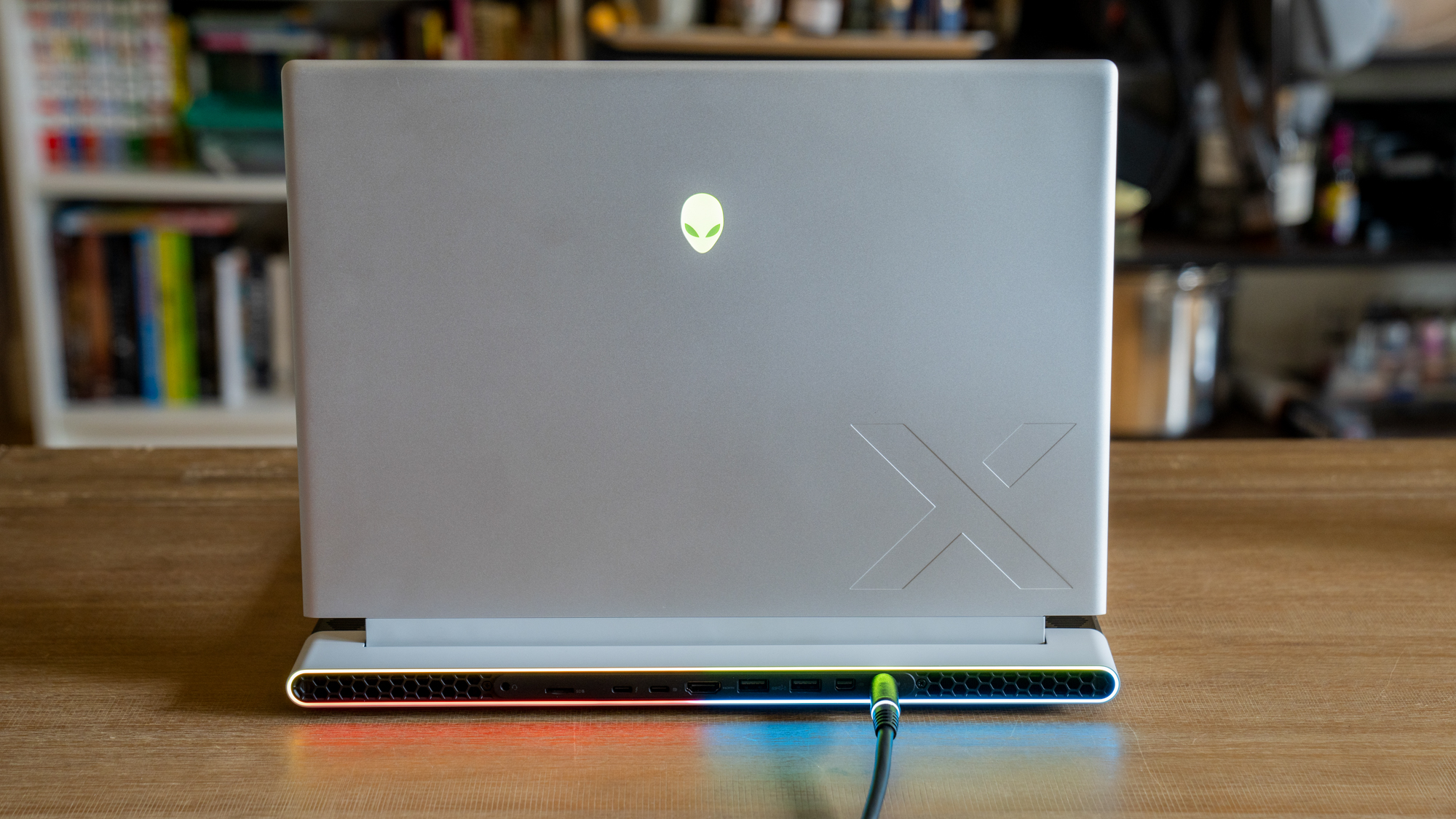
What is it? A (relatively) sleek gaming laptop that doesn't sacrifice aesthetic appeal.
Who is it for? The gaming enthusiast who doesn't mind spending a little extra on frills.
What does it cost? $2,099 to start, $3,199 as configured.
What do we like? It delivers on the promise of great gaming on the go, and looks good doing it.
What don't we like? It's loud, the battery life isn't great, and the price is, well, pricey. But that's all standard fare.
Alienware x16 R2 review: Specs
Alienware x16 R2 review: The ups
Lights, keyboard, action
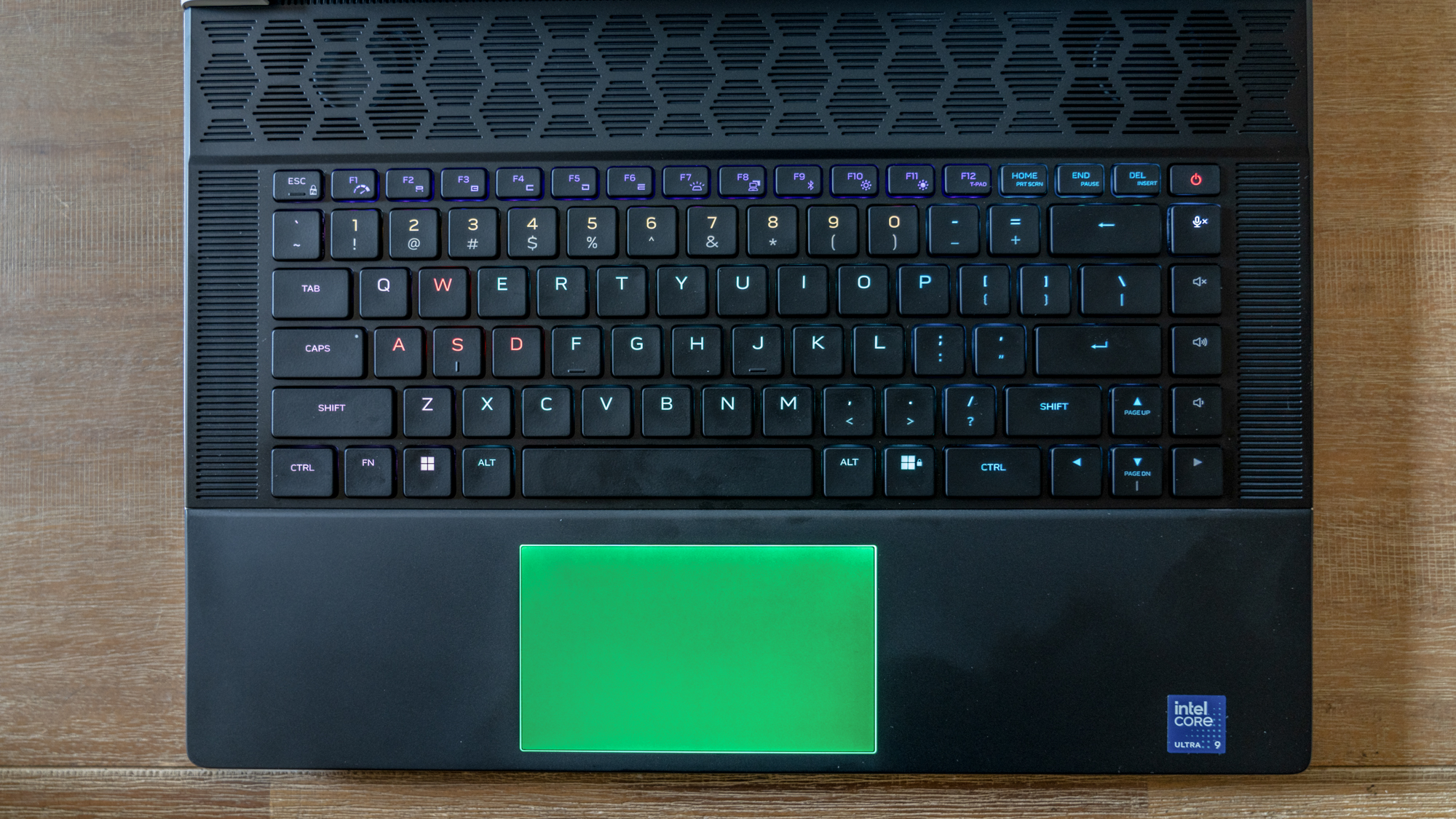
The sublime clickety-clack of a mechanical keyboard isn't an explicit reason to seek one out on a laptop, but it helps. The keys on the optional CherryMX mechanical keyboard are wide and spacious, with a low profile that makes for a comfortable typing experience. And there's ample room for all the keys (even the arrows!) at the expense of a slightly squished function row — if you find yourself using something beyond WASD, you’ll be fine. It is an optional extra, though; opt for a standard keyboard and the price of this configuration drops from $3,199 down to $3,099.99 (at time of writing). A mechanical keyboard for an extra $100, on a $3,000 machine? Do it. You're worth it.
The other key component of any gaming laptop is, of course, RGB lighting. You can customize every individual key, a ring on the rear of the laptop (divided into four sections), the Alien skull logo on the lid (looking at you, Razer), and even the touchpad. This level of customization is always lost on me and I'm still baffled by the concept of an RGB touchpad (who asked for this? How do I thank them?), but my riot of color is someone else's expressive canvas. And you can always pick a single neutral color or turn the lights off entirely, if you'd like.
The 16-inch display and roomy keyboard means you're likely chucking this into a backpack, and at about 5.9 pounds you probably won't forget its in there. But it's surprisingly svelte — less than an inch thick when closed — and arranging all of the ports on the rear keeps cables tidy.
Plenty of power for productivity and gaming
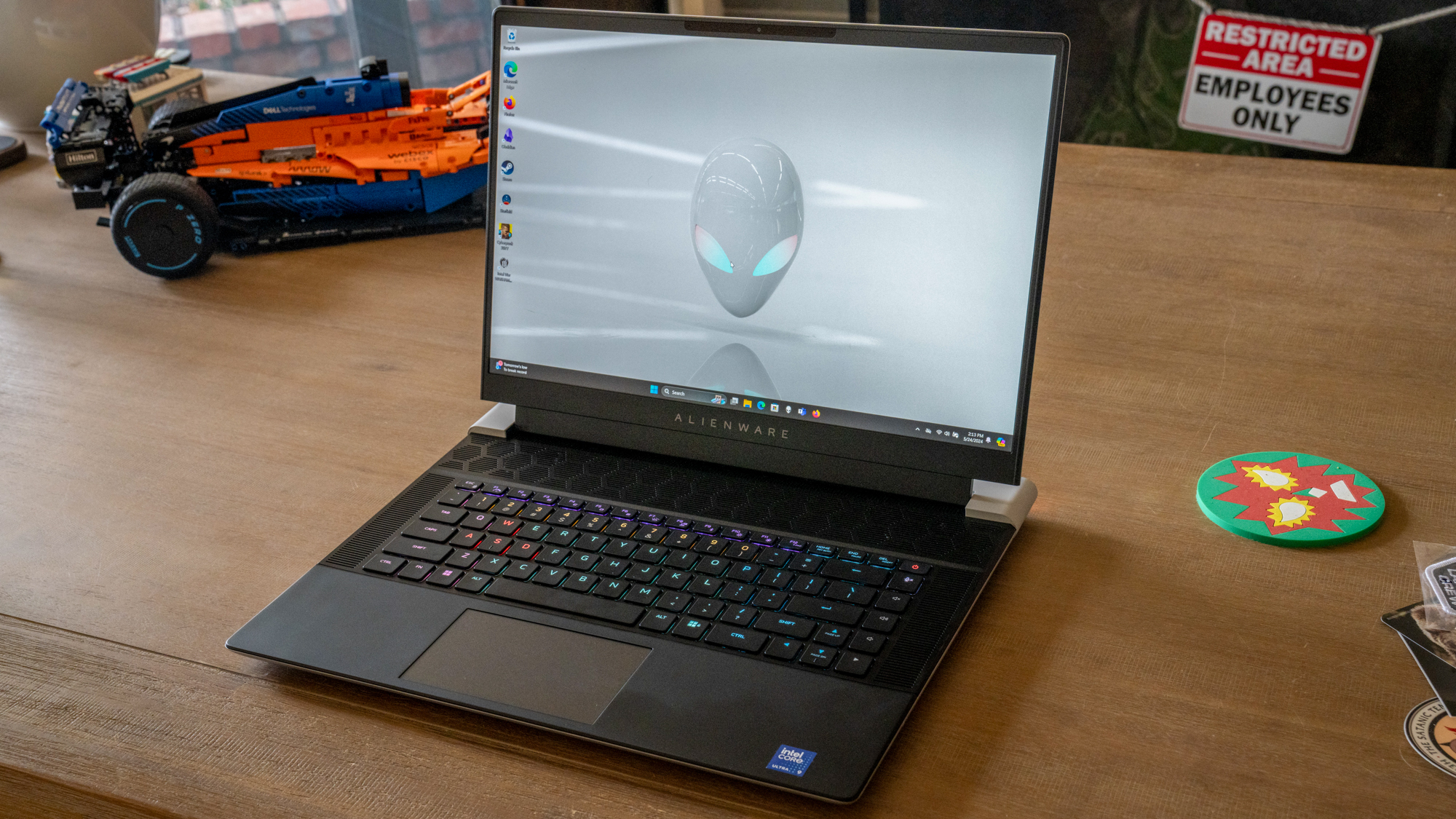
I suppose the internals on a gaming laptop matter too. Three thousand dollars is a lot to spend on a gaming laptop, and while a lot of that money is going towards branding and build quality, the Alienware x16 R2's innards are up to snuff.
The loadout of our review unit includes an Nvidia RTX 4080 GPU paired with an Intel Core Ultra 9 185H CPU and 32GB of RAM. Windows 11 Home sits on the 1TB M.2 NVMe drive, which feels like a paltry amount of space now that just about every game I'm installing weighs in at 100GB, minimum. The configurator lets you opt for up to 4TB, or 8 TB in a RAID 0 configuration, with the requisite leap in price.
Jam expensive components into a machine, and you're going to see strong test results. The Alienware x16 R2 scored 13,874 on the GeekBench 6.3 multicore test, scooting past the Razer Razer Blade 16 (2023) (13,609) and the Lenovo Legion Pro 5 Gen 8(13,524). The NVMe SSD transferred 25GB of files in 15.12 seconds, an effective transfer rate of 1.78GB per second; essentially identical to the Razer Blade's 1.8GB per second, and just behind the Legion Pro 5's 2.1GB per second.
On our Handbrake test, which consists of transcoding a 4K video to 1080p, the Alienware x16 R2 took 3 minutes and 33 seconds. The Razer Blade took 4 minutes and 13 seconds, while the Legion Pro 5 took 4 minutes and 5 seconds. These results are essentially neck and neck, with the variances in scores down to display resolutions, minute hardware differences and the like.
Synthetic benchmarks give you an idea of where a machine falls amongst its peers, but you're probably more interested in its gaming prowess. I'm still hammering away at Total War Warhammer III, which the Alienware x16 R2 handles with aplomb: 84 frames per second in the "Battle" benchmark, at the display's native 2,560 x 1,600 resolution, on the Ultra preset. In Cyberpunk 2077's Ray Tracing Ultra benchmark, which uses the Nvidia RTX GPU's DLSS, it earned an average of 64.18 frames per second at the native resolution.
Our Alienware x16 R2 review unit performed well in our lab as well, which you can see in the chart of results above. This stylish machine was mostly neck-and-neck with similarly-sized and -priced gaming laptops, though it fell short where Far Cry 6 is concerned.
Looks and sounds great
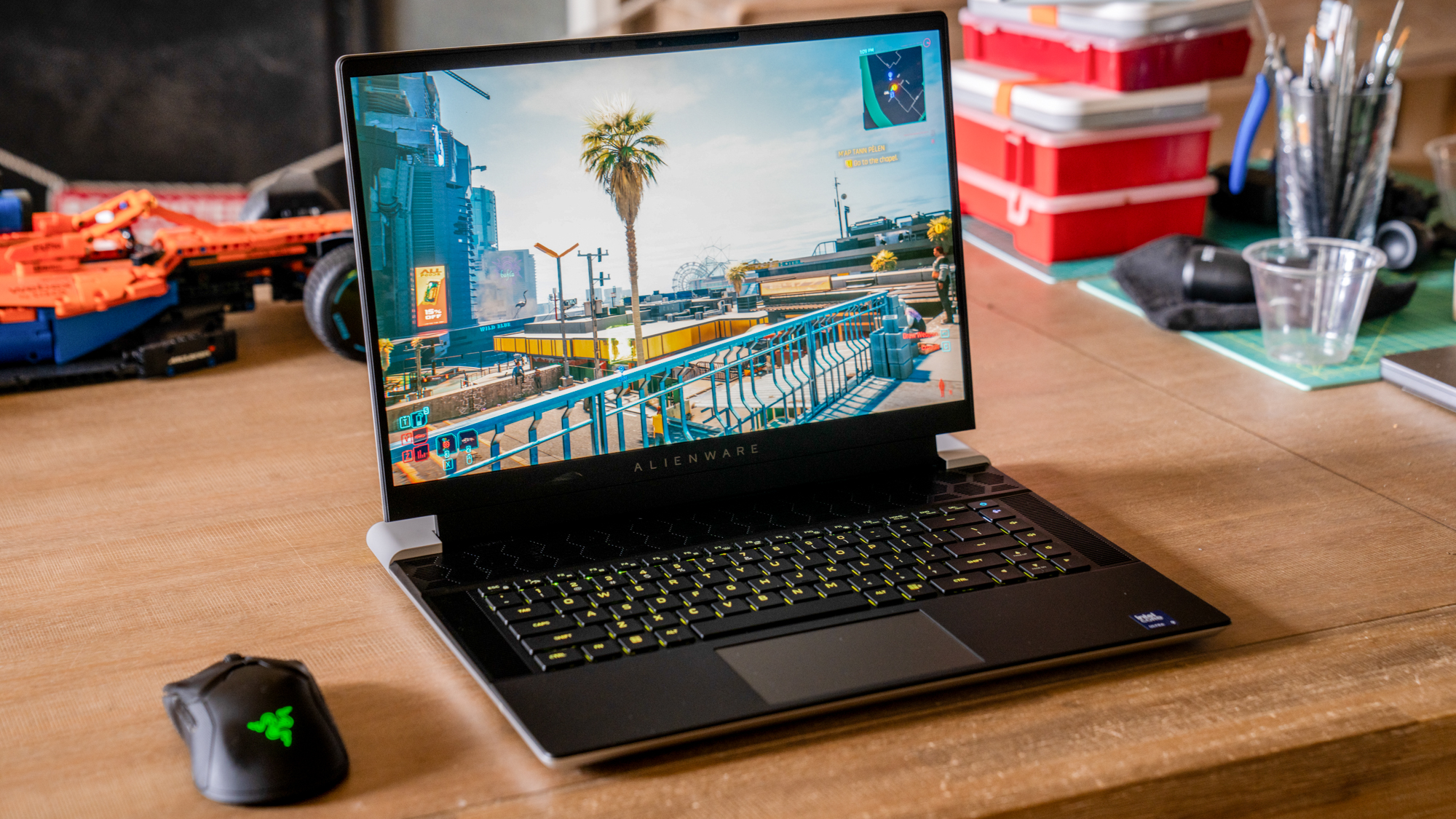
And the games look great, too. The 16-inch screen on our review unit pairs that 2,560 x 1,600-pixel resolution with a 240Hz refresh rate. I’ll always opt for higher refresh rates over higher resolutions, and while 4K and OLED displays are nice, I’d rather save the significant number of bucks they’d add to the price and lap up a smooth, responsive experience. Dell's configurator offers a 16-inch 1,920 x 1,200-pixel display with a 480Hz refresh rate; that's just overkill.
We recorded 114.% sRGB coverage in our display testing. The ideal for things like photography and color-sensitive work would be as close to 100% as possible, but vibrant, slightly oversaturated colors can be pleasant where gaming is concerned. My suite of test images looked great, and while my focus was on gaming, I've been watching plenty of trailers and speculation videos in preparation for the next Destiny 2 expansion, and non-interactive content looks good too.
Viewing angles are strong, even at awkward angles, and it’s suitably bright in most lighting conditions; I occasionally had to squint outdoors, in direct sunlight. We measured and average of 334 nits of brightness in our testing; less than the OLED-equipped competition, still plenty comfortable.
The audio is a little bass-heavy, out of the box. This is fine, actually, especially in light of the tinny warble you can expect a little too often out of laptops. The Dolby Atmos software allows for some fine tuning, to get that aural soundscape just right, and the speakers can really sing if you've got access to the right Dolby Atmos-tuned content. I’m no audiophile, but I managed to nudge the equalizer just enough to get those dwarven artillery barrages in Total War Warhammer III sounding just right.
Alienware x16 R2 review: The downs
Get ready to get loud
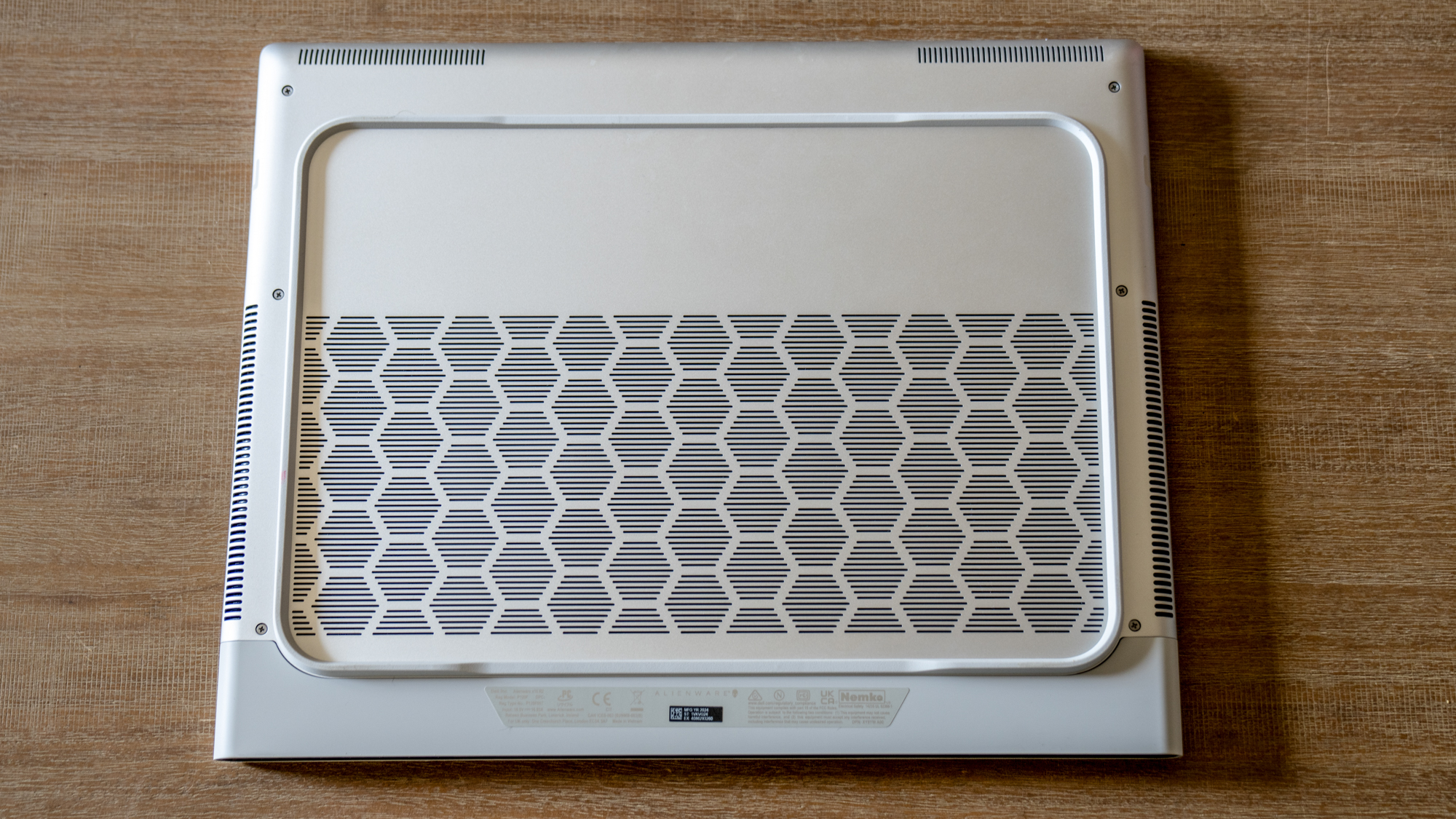
The speakers can fill a room with sound, which you’ll appreciate when the Alienware Command Center software swaps the machine over to its Performance preset and the fans roar to life. They’re loud: in line with what you should expect when trying to cram this much performance into a “portable” chassis, but something to be aware of should you decide to sneak a few Diablo IV dungeons during class or an interminable meeting. You can define a custom preset try to find something manageable, though you're limited to setting limits on the temperature and clocks speeds (presumably to avoid roasting the internals). Realistically, there's only so much you can do: this hardware generates heat, and it’s got to go somewhere.
Battery life ain't great
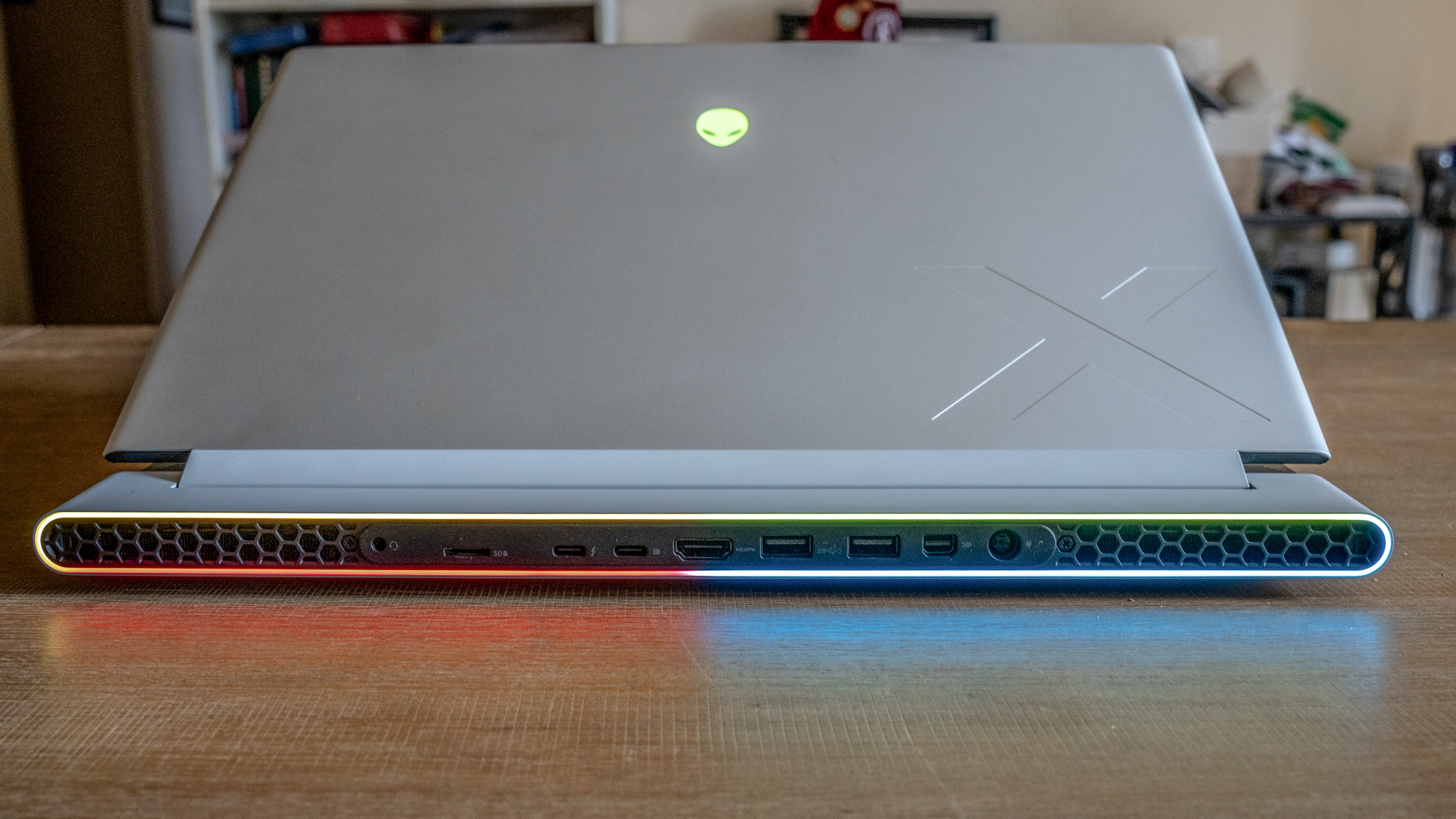
Not to worry, though: on our gaming battery test we saw about one hour and 20 minutes of battery life, so when you’re off the leash you won’t be procrastinating for very long. Things are a little better under less intensive workloads: in our web surfing battery test, which consists of setting the display’s brightness to 150 nits and browsing the web, we saw 6 hours and 31 minutes of life. Not quite enough to get through the average working day, but machines like this aren’t designed to stray from an outlet for too long anyway.
Also, I'd love to see an Ethernet port on this machine, so I don't have to lean on Wi-Fi or dongles while gaming. And there's also that microSD card slot. Really? This thing is huge, there's got to be a little more space in there.
Alienware x16 R2 review: Verdict
The Alienware x16 R2's drawbacks are par for the course with gaming laptops. It's heavy, the fans are loud, and you're approaching MacBook Pro-level pricing to get your games on the go.
If that's your aim, the Alienware x16 R2 can scrap with the best at a price that, while high, isn't actually as lofty as some of the competition. It's hot and heavy, but not all that cumbersome. It's loud, but... actually no it's pretty loud. But that's to be expected, only really a problem when you're gaming, and can be mitigated with some performance tweaks (or headphones).
Whether or not it's "worth" the price is going to be subjective. The budget-friendlier Lenovo Legion Pro 5 Gen 8 gets good enough frame rates for much less, even surpassing the x16 R2 in some of our game benchmarks, but if this is your sole gaming machine you'll certainly get more life (and action) out of beefier hardware.







